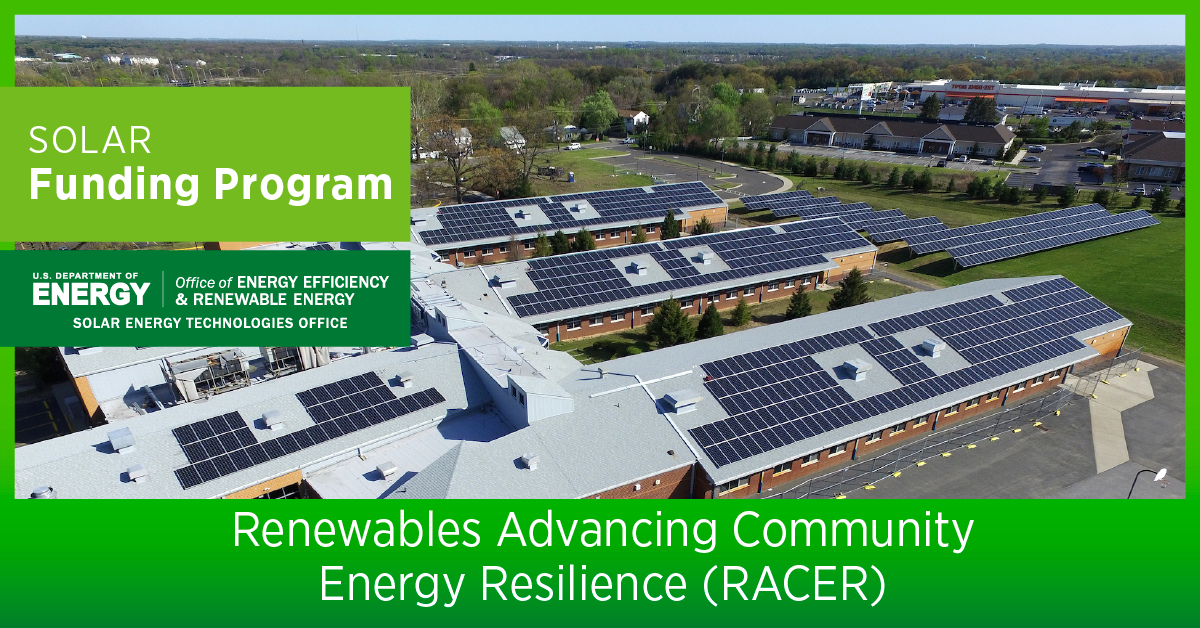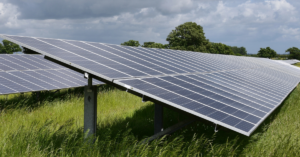Resilient Renewable Energy to Diminish Disaster Impacts on Communities
 The North Carolina Clean Energy Technology Center (NCCETC) at NC State University announced that it was selected to receive a $1 million award from the U.S. Department of Energy (DOE) Solar Energy Technologies Office (SETO) to enable communities to use solar and solar-plus-storage to enhance resilience and prevent disruptions in power caused by extreme weather and other events.
The North Carolina Clean Energy Technology Center (NCCETC) at NC State University announced that it was selected to receive a $1 million award from the U.S. Department of Energy (DOE) Solar Energy Technologies Office (SETO) to enable communities to use solar and solar-plus-storage to enhance resilience and prevent disruptions in power caused by extreme weather and other events.
This project, titled Resilient Renewable Energy to Diminish Disaster Impacts on Communities (Resilient REDDI Communities), will develop a novel set of resiliency metrics and create a playbook to guide emergency managers and their communities to assess and implement enhanced energy resilience strategies to mitigate the effects of energy loss during a disaster.
 The project team will work with a cohort of up to 12 diverse communities to develop and test a process for selecting facilities, assessing for economic feasibility, determining resilience benefits and developing the resilience resources. An important outcome will be the identification of ready-to-develop solar photovoltaic (PV) and energy storage projects that can benefit the cohort communities. Through the use of the new metrics, these projects will have additional justification based on their risk mitigation and impact reduction benefits.
The project team will work with a cohort of up to 12 diverse communities to develop and test a process for selecting facilities, assessing for economic feasibility, determining resilience benefits and developing the resilience resources. An important outcome will be the identification of ready-to-develop solar photovoltaic (PV) and energy storage projects that can benefit the cohort communities. Through the use of the new metrics, these projects will have additional justification based on their risk mitigation and impact reduction benefits.
“A primary focus of the project will be the use of distributed energy resilience resources, such as solar and energy storage, at several levels of local disaster response – local critical infrastructure facilities, community outposts and low income housing for example” said Isaac Panzarella, principal investigator for the Resilient REDDI Communities project and Associate Director of Technical Services for the NCCETC .
 The responsibilities of Emergency Management agencies are extensive and constant, through four generally recognized phases: Mitigation, Preparedness, Response and Recovery. Energy assurance is only one of many key emergency support functions, and the availability of electricity during and after a disaster is a very important metric for community resilience. Panzarella noted that the playbook will also include a framework for integrating enhanced community energy resilience in the planning and execution for each phase of emergency management.
The responsibilities of Emergency Management agencies are extensive and constant, through four generally recognized phases: Mitigation, Preparedness, Response and Recovery. Energy assurance is only one of many key emergency support functions, and the availability of electricity during and after a disaster is a very important metric for community resilience. Panzarella noted that the playbook will also include a framework for integrating enhanced community energy resilience in the planning and execution for each phase of emergency management.
“The City of Asheville is honored to be a part of this outstanding project team,” said Bridget Herring, the City’s Sustainability Director. “We look forward to utilizing this opportunity to further understand and discuss the nexus between climate justice, resilience and emergency management in our community.”
NCCETC was selected as a part of the Renewables Advancing Community Energy Resilience (RACER) funding program, an effort to increase the resilience of energy systems, increasing communities’ preparedness to withstand and recover rapidly from disasters. The Resilient REDDI Communities project is one of several projects that will develop energy resilience planning frameworks at the community level through robust multi-stakeholder participation and collaboration.
 The NCCETC team, led by Principal Investigator Isaac Panzarella, along with NC State University co-Principal investigators Christina Kopitopoulou, Dr. Harrison Fell and Dr. Jordan Kern. The project team includes several important partners as listed below
The NCCETC team, led by Principal Investigator Isaac Panzarella, along with NC State University co-Principal investigators Christina Kopitopoulou, Dr. Harrison Fell and Dr. Jordan Kern. The project team includes several important partners as listed below
- The City of Asheville
- The City of Wilmington
- North Carolina State Energy Program within the NC Department of Environmental Quality
- NC A&T University in Greensboro, NC
- The Smart Electric Power Alliance (SEPA)
ABOUT THE N.C. CLEAN ENERGY TECHNOLOGY CENTER
The N.C. Clean Energy Technology Center, as part of the College of Engineering at North Carolina State University, advances a sustainable energy economy by educating, demonstrating and providing support for clean energy technologies, practices and policies. It serves as a resource for innovative, sustainable energy technologies through technology demonstration, technical assistance, outreach and training. For more information about the Center, visit: http://www.nccleantech.ncsu.edu. Twitter: @NCCleanTech
ABOUT THE SOLAR ENERGY TECHNOLOGIES OFFICE
The U.S. Department of Energy Solar Energy Technologies Office supports research and development across the solar energy spectrum to drive innovation, lower costs, and support an equitable transition to a decarbonized economy. Learn more at energy.gov/solar-office.